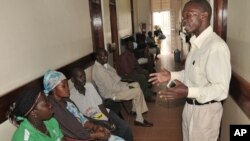KAMPALA —
Uganda is launching it’s first-ever "stigma index,” quantifying the degree and types of stigma suffered by people living with HIV/AIDS. The organization publishing the report hopes that bringing the issue to light will help create policies to fight discrimination, and eventually conquer it.
The index was launched Tuesday by the National Forum of People Living with HIV/AIDS Networks in Uganda, or NAFOPHANU. Based on a survey of over 1,000 HIV positive people across the country, it found that the most common forms of stigma are gossip, verbal insults and threats.
NAFOPHANU’s Margaret Happy said this type of stigma can create shame and guilt, and often prevents people from accessing treatment. She added that stigma does not stop at verbal abuse.
“Eleven percent of the respondents revealed that they were forced to undergo sterilization because they were tested HIV positive. Over 21 percent of the respondents revealed that they lost their jobs because of being HIV positive,” she said.
A further 41 percent said they were excluded from family activities, and 20 percent had been physically assaulted because of their HIV status.
Uganda was once an international poster child for its effective response to its AIDS epidemic. But now the country’s infection rate is once again on the rise, and Happy said pervasive stigma is helping neither HIV positive people nor the country as a whole.
Quantifying the problem through an index, she added, should help in creating policies that can fight discrimination within communities.
“It is going to inform policy, but also it’s going to inform programing so most of the interventions to fight stigma would be evidence-based," she said. "As people living with HIV we experience stigma, but we did not have something documented. But now that we have the evidence, it gives us very good ground for influencing for policy change.”
Happy said NAFOPHANU plans to conduct the survey regularly to monitor Uganda’s progress. Similar studies have been done in Kenya, Ethiopia, Nigeria and South Africa.
The index was launched Tuesday by the National Forum of People Living with HIV/AIDS Networks in Uganda, or NAFOPHANU. Based on a survey of over 1,000 HIV positive people across the country, it found that the most common forms of stigma are gossip, verbal insults and threats.
NAFOPHANU’s Margaret Happy said this type of stigma can create shame and guilt, and often prevents people from accessing treatment. She added that stigma does not stop at verbal abuse.
“Eleven percent of the respondents revealed that they were forced to undergo sterilization because they were tested HIV positive. Over 21 percent of the respondents revealed that they lost their jobs because of being HIV positive,” she said.
A further 41 percent said they were excluded from family activities, and 20 percent had been physically assaulted because of their HIV status.
Uganda was once an international poster child for its effective response to its AIDS epidemic. But now the country’s infection rate is once again on the rise, and Happy said pervasive stigma is helping neither HIV positive people nor the country as a whole.
Quantifying the problem through an index, she added, should help in creating policies that can fight discrimination within communities.
“It is going to inform policy, but also it’s going to inform programing so most of the interventions to fight stigma would be evidence-based," she said. "As people living with HIV we experience stigma, but we did not have something documented. But now that we have the evidence, it gives us very good ground for influencing for policy change.”
Happy said NAFOPHANU plans to conduct the survey regularly to monitor Uganda’s progress. Similar studies have been done in Kenya, Ethiopia, Nigeria and South Africa.




